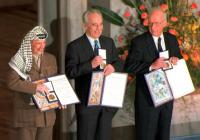-
In Europe, nationalism is rising
Over the past seventy-five years, many Western nations moved steadily toward cooperation and interconnectedness, as their shared economic and political interests converged during this period called globalization. But the political winds are shifting, and there are signs of a new age of populism and nationalism emerging in Europe, a development that eventually could undermine post-war security and unity. After the triumphs of Trump and Brexit, right-leaning parties see paths to political power.
-
-
Preferential trade agreements bolster global trade at the expense of its resilience
The global commodity trade is a complex system where its network structure, which may arise from bilateral and multilateral agreements, affects its growth and resilience. At time of economic shocks, redundancy in this system is vital to the resilience of growth.
-
-
Russia violates landmark arms-control treaty by secretly deploying banned cruise missile

The Trump administration may be facing its first challenge from Russia as news emerged that Russia had secretly deployed a new cruise missile. The development and deployment of the cruise missile violates a landmark arms control treaty, signed in 1987 – the Intermediate-Range Nuclear Forces Treaty (INF Treaty) — which prohibited the development and deployment by the United States and Russia of land-based intermediate-range missiles.
-
-
Russian nationalists tried to topple pro-West Montenegro government
Montenegro said that Russian nationalists were behind a coup attempt in Montenegro. The coups involved assassinating the pro-Western prime minister because of his government’s support for joining NATO, and install a pro-Russian coalition to run the country. Moscow has openly supported what it called the “patriotic parties” in Montenegro which oppose Montenegro becoming a member of NATO. Serbia has deported an undisclosed number of Russian diplomates and operatives who were monitoring the Montenegro prime minister’s movements from Serbian territory.
-
-
False economy: Savings from cutting U.S. overseas security commitments dwarfed by lost U.S. trade
Proponents of U.S. foreign policy “retrenchment” have called for steep reductions in U.S. overseas security commitments, contending that the U.S. commitments are too costly to sustain, allow partner governments to free-ride off the U.S. defense budget, and fail to deliver the promised security and stability. A new study finds, however, that the policy of engagement the United States has followed since the 1940s has contributed greatly to U.S. prosperity by making the world politically and militarily stable, thus fostering international economic stability which has benefitted the United States by increasing trade in goods and services and access to global capital, leading to higher rates of economic growth at home. Reducing U.S. overseas security commitments, including U.S. troops stationed abroad as well as U.S. security treaties, could lead to greatly reduced U.S. trade with other countries, with the economic costs from lost trade estimated to be more than triple any associated savings in U.S. defense spending.
-
-
Suspension of U.S.-Russia plutonium disposal agreement a setback: Expert
Earlier this week the lower house of the Russian parliament approved President Vladimir Putin’s decree on suspending the U.S.-Russian Plutonium Management and Disposition Agreement (PMDA), which requires each nation to dispose of thirty-four metric tons of plutonium from its dismantled nuclear weapons and military stockpiles. Russia has claimed that the United States is violating the agreement by changing its disposition method from irradiating the plutonium as mixed-oxide (MOX) fuel for commercial nuclear reactors to a process called dilute and dispose, but a nuclear expert says that the United States has not violated the terms of the PMDA by proposing that it change its plutonium disposition approach.
-
-
Resolving border issues offers rival nations best hope of moving toward peace
Resolving border disputes gives rival nations the best hope for moving toward peace. A new study concludes that settling territorial conflicts had a greater impact on rival nations’ relations than democratization or ending civil wars. Border disputes create a threat that prompts citizens to give their leaders greater autonomy in exchange for protection. This leads to a more aggressive foreign policy and militarization.
-
-
Close Putin ally: If Americans fail to vote for Trump, they risk nuclear attack
Vladimir Zhirinovsky, a nationalist Russian politicians who is one of Vladimir Putin’s staunchest allies, said Americans should vote for Donald Trump or risk a nuclear war. Zhirinovsky said that electing Trump would be a “gift to humanity,” while electing Hillary Clinton would likely start a third world war. Zhirinovsky is a flamboyant and colorful individual typically offering brazen, even outrageous, comments, which appeal to the nationalist segment of the Russian electorate. As a close ally of Putin, Zhirinovsky has regularly been used to float policy ideas.
-
-
Russia’s ultimatum to US: Reduce commitment to NATO, lift sanctions – or nuclear deal is off
The Kremlin, in an unprecedented series of ultimatums on Monday, said Russia would suspend an agreement it had signed with the United States to turn weapons-grade plutonium into nuclear reactor fuel unless the United States rescinds the sanctions imposed on Russia because of its annexation of Crimea – and also cuts its military commitments to NATO. The Kremlin said that both the economic sanctions and the U.S. military commitments to its NATO allies are “unfriendly” acts to ward Russia.
-
-
Shimon Peres and the legacy of the Oslo Accords

Shimon Peres, the former prime minister of Israel, has died at the age of 93. A titan of Israeli political life, Peres remained an active player in his country and the region until his death, working hard to promote closer ties between Israelis and Palestinians. He will be remembered above all else for his role in negotiating the 1993 Oslo Peace Accords and for winning the Nobel Peace Prize in 1994 along with then-Israeli Prime Minster Yitzak Rabin and Yasser Arafat. The Oslo Accord delayed dealing with the core issues of the Israeli-Palestinian conflict — the status of Jerusalem, right of return for the 1948 Palestinian refugees, the status of the Jewish settlements in the West Bank and Gaza, the borders of the Palestinian territory – for a later date, but that date has yet to arrive. Although the two sides are far apart, Peres died an optimist, still hopeful that the day would come when the Israeli Defense Forces’ soldiers would serve purely for peace. As he famously put it: “Impossibility is only a product of our prejudice.”
-
-
U.S., Israel sign record 10-Year, $38 billion defense package
After nearly a year of negotiations, Israel and the United States have signed a record $38 billion, 10-year military aid package. The deal is “the single largest military assistance package — with any country — in American history,” American ambassador to Israel Dan Shapiro said
-
-
Togo organizing Israeli-African security and development summit
The West African nation of Togo is taking the lead in organizing an Israeli-African “security and development” summit, which it offered to host in its capital next year. Israel has a long history of sharing its economic and security expertise with countries on the continent, and Jerusalem hopes that increased ties with African nations will lead to a shift in their voting trends at the UN and other global for a. Israel’s relations with many African countries were disrupted by Israeli-Palestinian tensions, but African countries which had severed diplomatic relations with Israel in the early 1970s are now resuming relations. Last month, the Muslim-majority Republic of Guinea restored diplomatic ties with Israel after a 49-year break.
-
-
Israel opens border with Syria to humanitarian aid deliveries
The Israeli government has authorized the delivery of humanitarian aid into war-torn Syria through the nations’ shared border. While Israel activists have sought to help Syrians in the past, delivering aid across the border has been complicated by the fact that many towns and cities on the Syrian side of the Golan Heights are controlled by the Islamic State or the al-Nusra Front, an affiliate of al-Qaeda.
-
-
Don’t believe the Brexit prophecies of economic doom
The shock and horror at the Brexit vote has been loud and vociferous. Some seem to be reveling in the uncertainty that the referendum result has provoked. But there are plenty of reasons to reject the consensus that Brexit will be costly to the U.K.’s economy. Even though markets appear stormy in the immediate aftermath of the vote, the financial market reaction to date has more characteristics of a seasonal storm than of a major catastrophe. There will undoubtedly be winners and losers from the U.K.’s decision to leave the EU. But indexes for volatility are already lower than they were in February this year, suggesting that markets are not abnormally worried about the outlook, and U.K. government borrowing costs are at an all-time low. This is further reason to reject the pre-referendum consensus that Brexit would bring economic doom.
-
-
Brexit: Europe’s new nationalism is here to stay
The British referendum that has delivered a vote for “Brexit” is the latest, dramatic indication that the atavistic nationalistic impulses of the twentieth century – impulses which the construction of the EU was supposed to lay to rest — are here to stay. This nationalism has brewed largely in reaction to how the EU has evolved over the past few decades. What started as a common market grew to embrace a single currency, the Schengen area, and integration in justice and home affairs. What we have witnessed with the rise of Euroscepticism is the recrudescence of a robust form of populist nationalism. It is sincerely anti-intellectual, offers facile solutions to complex problems, prefers what it calls “plain-speaking” over a well-articulated elocution, and is utterly unapologetic in its disdain for the establishment. Unless the EU can infuse its institutions with greater democratic legitimacy — voters need to be able to identify with the people who make decisions on their behalf — this populist nationalism will persist for the foreseeable future. The United Kingdom may be the first country to leave the EU but it may not be the last. Europe’s new nationalism is here to stay.
-
- All
- Regional
- Water
- Biometrics
- Borders/Immig
- Business
- Cybersecurity
- Detection
- Disasters
- Government
- Infrastructure
- International
- Public health
- Public Safety
- Communication interoperabillity
- Emergency services
- Emergency medical services
- Fire
- First response
- IEDs
- Law Enforcement
- Law Enforcement Technology
- Military technology
- Nonlethal weapons
- Nuclear weapons
- Personal protection equipment
- Police
- Notification /alert systems
- Situational awareness
- Weapons systems
- Sci-Tech
- Sector Reports
- Surveillance
- Transportation
Advertising & Marketing: advertise@newswirepubs.com
Editorial: editor@newswirepubs.com
General: info@newswirepubs.com
2010-2011 © News Wire Publications, LLC News Wire Publications, LLC
220 Old Country Road | Suite 200 | Mineola | New York | 11501
Permissions and Policies
Editorial: editor@newswirepubs.com
General: info@newswirepubs.com
2010-2011 © News Wire Publications, LLC News Wire Publications, LLC
220 Old Country Road | Suite 200 | Mineola | New York | 11501
Permissions and Policies
